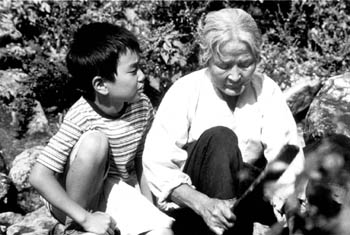![[Metroactive Movies]](/movies/gifs/movies468.gif)
[ Movies Index | Show Times | Silicon Valley | Metroactive Home | Archives ]

Photograph by Mi-Jan Han Generation Bridge: Young Sang-woo and his grandma learn to connect in the new Korean feature 'The Way Home.' Grandma's Boy 'The Way Home' outdoes even kimchi as a Korean heartwarmer MY GRANDMOTHER Jodelle Simpson Murphy was the noblest woman who ever walked the earth. Nevertheless, The Way Home (a.k.a. Jibuero) didn't liquefy me, despite the film's honorable dedication "to all grandmothers," as well as its shameless-to-the-point-of-D.-W.-Griffith use of (grand)maternal sacrifice. One sample: the old woman (Eul-Boon Kim), bent to a 90-degree angle by osteoporosis, trudging out in the rain to fetch a meal for her ungrateful grandchild Sang-woo (Seung-Ho Yoo). Oh, but there's more. Take, for instance, the part where she decides to walk home, a mere matter of about 10 miles, having spent her bus fare on the kid to buy him a Choco-Pie. The film is just that relentless. This wholesome fare might work on susceptible types, maybe as a story for a child or to teach us all a lesson about the way Western crapola is inundating the traditional country-folk way of life. Either way, the film inspires guilt (and my sainted grandmother hated guilt worse than she hated dirt). The opening is a finely tuned piece of visual storytelling, akin to the opening of Jim Jarmusch's Dead Man. The trip from Seoul to a Korean mountain hamlet is indicated without dialogue, as a mother and child transfer between increasingly more crowded and rustic chicken buses. Because of serious money troubles, the young Sang-woo is left behind at his mute grandmother's cabin, which is open to the elements and has no indoor toilet or any diversion more exciting than a TV set (which picks up no channels). At first, the child is outraged, focusing on his can of Coca-Cola and his Game Boy instead of the grandmother, whom he calls "dummy" and "retard" as she tends to him. He demands Kentucky Fried Chicken, pizza, burgers and more batteries for his toys, stuff she couldn't afford, even if she knew what he was talking about. As the summer goes by, because of her tenderness, he eventually learns of the true all-suffering, all-enduring nature of a grandma's heart. The mountain locations, seen in the late summer, represent the kind of country living that people from the city pay good money to get away to. That's appealing, and so are the scenes of rustic markets, Sang-woo's shy crush on a local girl and his rivalry with a local boy. (The film's closest brush with violence: the antics of an ornery cow that runs around the countryside chasing children.) But subtle sentiment is unknown in this movie, which makes it different from the neorealist classics The Way Home has been likened to. By overdoing it so much, director Jeong-Hyang Lee doesn't inspire an active desire to see the child change but an urge to shape him up as his grandmother won't. One of my friends was riding a bus and overheard an elderly church lady watching a shrieking toddler misbehave. She said, to no one in particular, "That child needs a spicy bottom." That phrase came to mind watching The Way Home.
The Way Home (PG; 85 min.), directed and written by Jeong-Hyang Lee, photographed by Hong-Shik Yoon and starring Seung-Ho Yoo and Eul-Boon Kim, opens Friday at the Towne in San Jose.
Send a letter to the editor about this story to letters@metronews.com. [ Silicon Valley | Metroactive Home | Archives ]
|
From the December 12-18, 2002 issue of Metro, Silicon Valley's Weekly Newspaper.
Copyright © Metro Publishing Inc. Metroactive is affiliated with the Boulevards Network.
For more information about the San Jose/Silicon Valley area, visit sanjose.com.